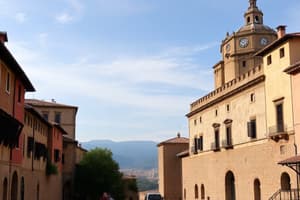Podcast
Questions and Answers
What is feudalism?
What is feudalism?
Feudalism was a social and political system characterized by a hierarchy of lords and vassals, with the lords granting land to their vassals in exchange for military service.
Who was Charlemagne?
Who was Charlemagne?
Charlemagne, also known as Charles the Great, was a Frankish ruler who established the Carolingian dynasty and expanded the Frankish Empire to include much of Western Europe.
What were the key characteristics of the medieval period?
What were the key characteristics of the medieval period?
The medieval period was marked by the emergence of new political entities, the spread of Christianity, and the development of feudalism.
What role did Charlemagne play in shaping the political and cultural landscape of Europe?
What role did Charlemagne play in shaping the political and cultural landscape of Europe?
Signup and view all the answers
Who established the Holy Roman Empire?
Who established the Holy Roman Empire?
Signup and view all the answers
What was the Byzantine Empire also known as?
What was the Byzantine Empire also known as?
Signup and view all the answers
What were the Papal States?
What were the Papal States?
Signup and view all the answers
What facilitated the spread of Christianity throughout Europe in the medieval period?
What facilitated the spread of Christianity throughout Europe in the medieval period?
Signup and view all the answers
Study Notes
Medieval History
The medieval period, also known as the Middle Ages, lasted from the 5th to the 15th century. It was a time characterized by the decline of the Western Roman Empire and the emergence of new political entities in Europe, such as the Holy Roman Empire, the Byzantine Empire, and the Papal States. The medieval period was also marked by the spread of Christianity and the development of feudalism.
Political Entities
During the medieval period, several political entities emerged, including:
-
Holy Roman Empire: Established by Charlemagne, the Holy Roman Empire was a political entity that controlled much of Europe, with a strong focus on Christianity.
-
Byzantine Empire: The Byzantine Empire, also known as the Eastern Roman Empire, was a continuation of the Roman Empire in the East. It survived the fall of the Western Roman Empire and continued to be a significant political and cultural force in Europe.
-
Papal States: The Papal States were territories under the direct rule of the Pope, the head of the Catholic Church.
Spread of Christianity
The medieval period saw the spread of Christianity throughout Europe. This was facilitated by the conversion of many European rulers to Christianity and the establishment of a strong ecclesiastical hierarchy. The development of a Christian monastic tradition and the emergence of new religious orders played a significant role in the expansion of Christianity.
Feudalism
Feudalism was a social and political system that emerged during the medieval period. It was characterized by a hierarchy of lords and vassals, with the lords holding land and granting it to their vassals in exchange for military service. This system helped to stabilize political relations and maintain social order during a time of political upheaval and economic change.
Charlemagne
Charlemagne, also known as Charles the Great, was a significant figure during the medieval period. He was a Frankish ruler who established the Carolingian dynasty and expanded the Frankish Empire to include much of Western Europe. Charlemagne's reign was marked by political and cultural achievements, including the establishment of the Holy Roman Empire.
In conclusion, the medieval period was a transformative time in European history. It was marked by the emergence of new political entities, the spread of Christianity, and the development of feudalism. Charlemagne, in particular, played a significant role in shaping the political and cultural landscape of Europe during this period.
Studying That Suits You
Use AI to generate personalized quizzes and flashcards to suit your learning preferences.
Description
Explore the key aspects of the medieval period, including the emergence of political entities like the Holy Roman Empire, Byzantine Empire, and Papal States, the spread of Christianity, the development of feudalism, and the significance of Charlemagne's reign. Test your knowledge of European history during this transformative era.




